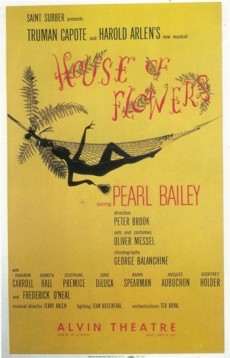
From Broadway To 52nd Street
House Of Flowers opened at the Alvin Theatre on December 12, 1954 with music by Harold Arlen and lyrics and book by Truman Capote. This was his only Broadway musical based on his own short story, which was first published as one of three extra pieces in the Breakfast At Tiffany’s novella. Pearl Bailey, Diahann Carroll, Juanita Hall, Alvin Ailey, Geoffrey Holder, Ray Walston and Carmen de Lavallade starred for 165 performances. The composition that emerged from this musical to become a jazz standard was “A Sleepin’ Bee”.
The Story: During a trade war between two Haitian brothel keepers, Madame Tango and Madame Fleur, the latter sells one of her girls, Ottilia, to a rich lord. Ottilia turns him down preferring young, handsome but poor mountain boy Royal. and despite Fleur’s machinations to seal Royal in a barrel and toss him into the ocean, he escapes his watery grave on the back of a turtle. The lovers eventually marry and live happily ever after.
Jazz History: Hard bop, an extension of bebop (or “bop”) music that incorporates influences from rhythm and blues, gospel, and blues especially in the saxophone and piano playing, developed in the mid-1950s, partly in response to the vogue for cool jazz in the early 1950s. The hard bop style coalesced in 1953 and 1954, paralleling the rise of rhythm and blues. Miles Davis’ performance of “Walkin'”, the title track of his album of the same year, at the very first Newport Jazz Festival in 1954, announced the style to the jazz world. The quintet, Art Blakey and the Jazz Messengers featuring pianist Horace Silver and trumpeter Clifford Brown were leaders in the hard bop movement along with Davis.
Modal jazz recordings, such as Davis’ Kind of Blue became popular in the late 1950s. Popular modal standards include Davis’s “All Blues All” and “So What”, John Coltrane’s “Impressions” and Herbie Hancock’s “Maiden Voyage”. These recordings would eventually lead to the formation of Davis’ second great quintet, which included saxophonist Wayne Shorter and pianist Herbie Hancock, recorded a series of highly acclaimed albums in the mid-to-late 1960s.
Sponsored By
www.whatissuitetabu.com


